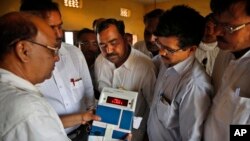India touts itself as the world’s largest democracy, and has the second largest national population in the world. India’s democracy is intricate and varies in how well it functions across geographic areas, within different parties and in parliament.
Simon Denyer is currently the China bureau chief for the Washington Post. He previously held that position in India for the past decade. Denyer has followed Indian politics through elections and governance and has chronicled the details and changes in its democracy in a new book, Rogue Elephant. He told VOA’s Jim Stevenson how India’s democracy has much hope in the hands of its people.
DENYER: You look at democracy from the top and you see corrupt politicians who don’t do their jobs very well, but if you look at democracy from the bottom up, what you see is a lot of heroic people struggling to make it better, to make it function better using the legal system to combat child trafficking, using the weapon of a hunger strike to try and force change, going and devoting their lives in villages promoting the Right to Information Act. These people, who really are affecting change from the bottom up, do create the huge pressure for Indian democracy to function better.
STEVENSON: Ten years ago when you arrived in India, the mood of the country was very upbeat and there was a lot of promise for the future. Things changed though during the tenure of Manmohan Singh – what do you think happened?
DENYER: I think that the euphoria, if you like, that happened in 2004 when I arrived was very overdone. India felt it had arrived on the world stage. It was a superpower in the making. As journalists, we weren’t really encouraged to report about poverty; we were encouraged to report about shopping malls, and gleaming new India, and IT centers, and call centers and so on and so forth.
What happened really was that India sat in its laurels, the government of Manmohan Singh didn’t introduce economic reforms, didn’t do the sort of things it needed to do to unleash the energy of the private sector. And more particularly, it fell into very corrupt ways, and we saw the mood really punctured by two things, one was a huge corruption scandal centered around the allocation of telecoms, mobile phone licenses, and the second was the Commonwealth Games. It was actually a bit of a national embarrassment for India. People were coming up to me and were really pessimistic about the future of India. I felt then, that that pessimism had been overdone as the optimism had been in 2004, because there was a lot of positive force for change that was bubbling up during that ten years.
STEVENSON: It led to a natural backlash in the most recent elections and Narendra Modi coming into power, plus the combination of the fact that social media played a huge role in this election whereas when you first covered the elections in 2004, we really didn’t have as vibrant a social media in India as we do now.
DENYER: Yeah, in fact the media rather than the social media have really played key roles from 2004 to 2014. The growth of 24-hour media, in many, many different languages and all the languages of India, really putting politicians right there in people’s living rooms and in people’s villages. The middle class really realized that they needed politicians to govern, they needed politicians to ensure law and order, they needed politicians to deliver infrastructure so that they could do business. Twitter and Facebook and 24-hour media really brought that home, and really got the middle class engaged once more in the political process.
STEVENSON: As much as you write about the big picture in democracy in India, you also touch on individuals in your book. And certainly Indians, along with the technology, were empowered with the Right to Information Act.
DENYER: Absolutely, it’s the most used Right to Information Act anywhere in the world - something like 7 million requests filed every year and growing year by year. That has given the poor a much greater voice, because in the past, the bureaucrats who ran things didn’t have to answer to the people, they just answered to their bosses, and the right to information act gave ordinary people the ability to question decisions and brought a level of transparency and accountability into the bureaucracy. The bureaucrats had to answer to people, and that’s a massive change. Because, in fact, bureaucrats felt that they were the lords of the village or the town or the district, and they didn’t have to take into account what people really wanted, they could make arbitrary decisions, and those decisions would stand. The right to information really gave the poor in India a voice. I think that, in any democracy, that’s a good thing.






